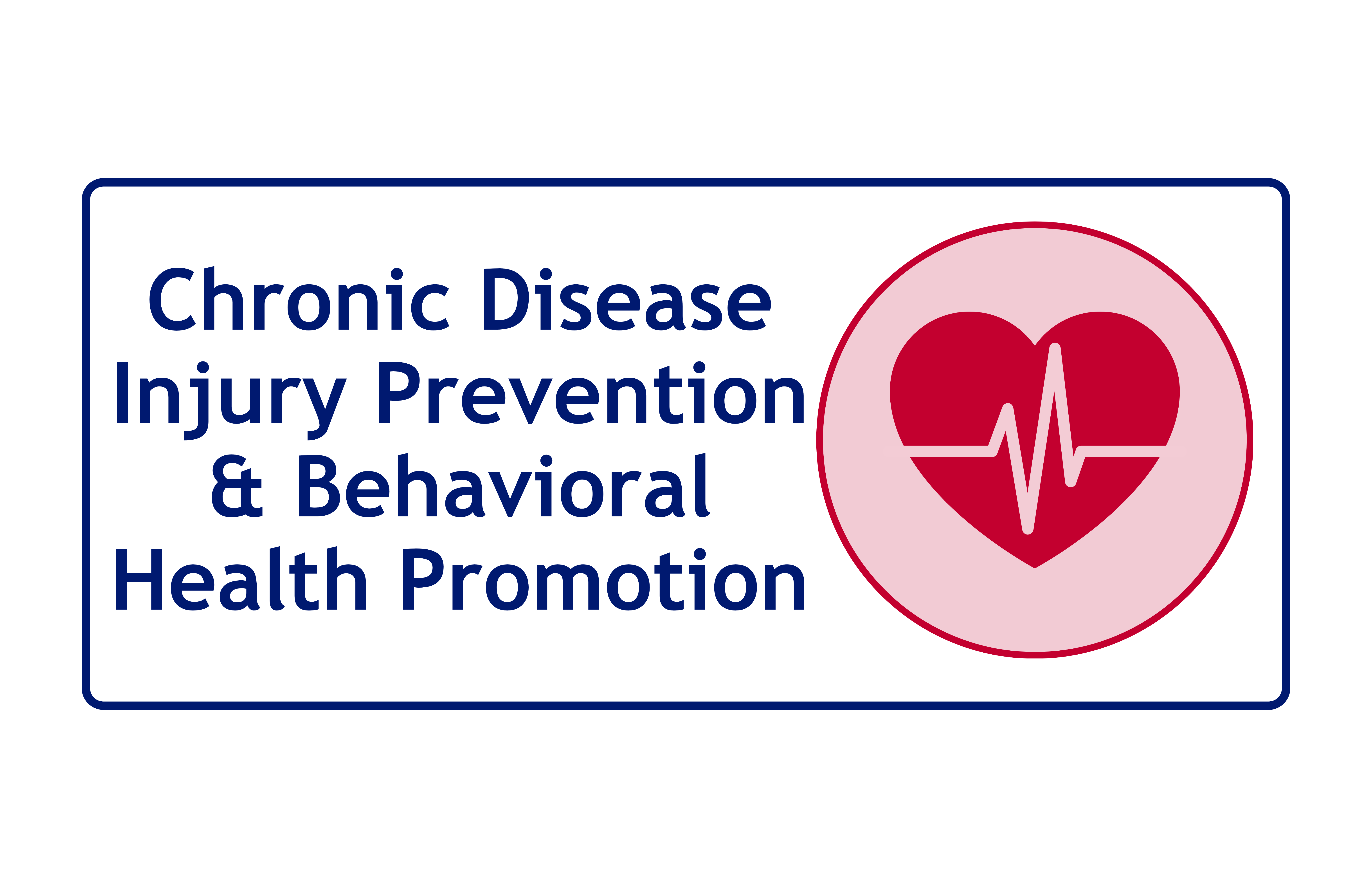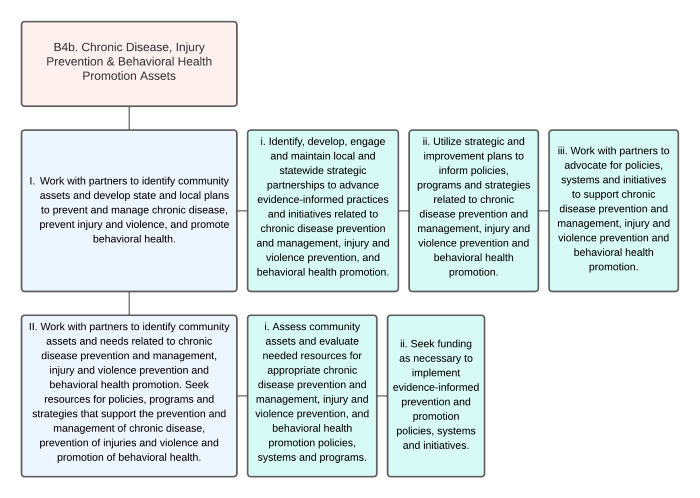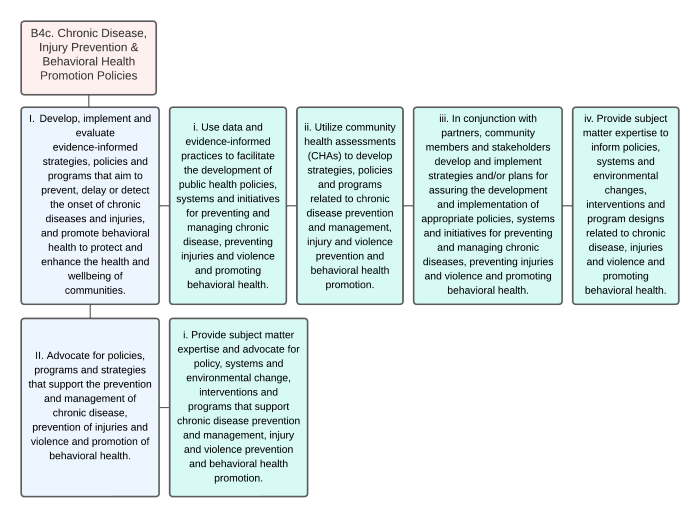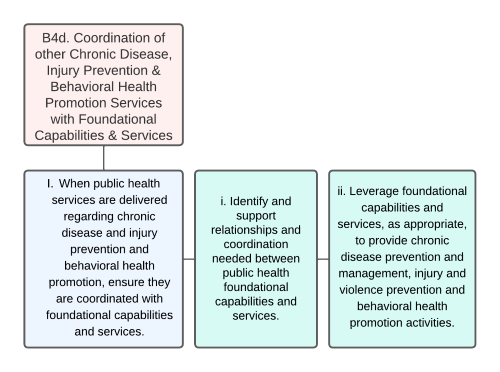B4. Chronic Disease, Injury Prevention and Behavioral Health Promotion

Chronic Disease, Injury Prevention and Behavioral Health Promotion: Colorado’s governmental public health system focuses on common risk and protective factors that affect social, emotional and physical health and safety.
To prevent chronic disease and injuries and promote behavioral health, Colorado’s governmental public health system will use policy, systems and environmental change strategies to comprehensively address the root causes of poor health outcomes and advance health equity. Priority areas include, but are not limited to, nutrition, physical activity, oral health, access to care and disease management, injury prevention, violence prevention, suicide prevention, mental health and substance use (including tobacco, alcohol and other substances).
Links:
- CDHS Office of Behavioral Health
- CDPHE Chronic Disease Prevention
- Injury & Substance Use Prevention
- Suicide Prevention
- PDF of B4 Flow Chart
The source Core Public Health Services Operational Definitions Manual 2019 is organized as follows:
|
Functions of Chronic Disease, Injury Prevention, and BH Promotion
B4a. Chronic Disease, Injury Prevention and Behavioral Health Promotion Data
I. Provide timely, relevant and accurate information statewide and to communities on chronic disease prevention and management, injury and violence prevention and behavioral health promotion.
i. Collect, analyze, interpret and share chronic disease prevention and management, injury and violence prevention and behavioral health promotion data pertaining to inequities.
ii. Collect and maintain data (such as risk factors, demographic information, surveillance, and fatality review data) on chronic disease prevention and management to support public health functions.
iii. Collect and maintain data (such as risk factors, demographic information, surveillance and fatality review data) on injury and violence prevention to support public health functions.
iv. Collect and maintain data (such as risk factors, demographic information, surveillance, and fatality review data) on behavioral health promotion to support public health functions.
v. Analyze, interpret and share data regarding chronic diseases with appropriate public health workforce, decision makers, governmental entities, partners, community members, stakeholders and others.
vi. Analyze, interpret and share data regarding injury and violence prevention with appropriate public health workforce, decision makers, governmental entities, partners, community members, stakeholders and others.
vii. Analyze, interpret and share data regarding behavioral health promotion with appropriate public health workforce, decision makers, governmental entities, partners, community members, stakeholders and others.
viii. Provide reports that measure the impact of chronic disease prevention and management, injury and violence prevention and behavioral health promotion activities. ix. As appropriate, prepare data to share and make available to stakeholders.
x. Provide communities and stakeholders with timely communications and recommendations to prevent and manage chronic disease, prevent injuries and violence, and promote behavioral health.
xi. Fulfill future data needs using multiple methods and sources for data collection, analysis and presentation using evolving technology with near real-time data displayed using visualization tools and GIS to meet user’s requests.
xii. Develop new and/or adapt existing data systems as needed.
B4b. Chronic Disease, Injury Prevention and Behavioral Health Promotion Assets
I. Work with partners to identify community assets and develop state and local plans to prevent and manage chronic disease, prevent injury and violence, and promote behavioral health.
i. Identify, develop, engage and maintain local and statewide strategic partnerships to advance evidence-informed practices and initiatives related to chronic disease prevention and management, injury and violence prevention, and behavioral health promotion.
ii. Utilize strategic and improvement plans to inform policies, programs and strategies related to chronic disease prevention and management, injury and violence prevention and behavioral health promotion.
iii. Work with partners to advocate for policies, systems and initiatives to support chronic disease prevention and management, injury and violence prevention and behavioral health promotion.
II. Work with partners to identify community assets and needs related to chronic disease prevention and management, injury and violence prevention and behavioral health promotion. Seek resources for policies, programs and strategies that support the prevention and management of chronic disease, prevention of injuries and violence and promotion of behavioral health.
i. Assess community assets and evaluate needed resources for appropriate chronic disease prevention and management, injury and violence prevention, and behavioral health promotion policies, systems and programs.
ii. Seek funding as necessary to implement evidence-informed prevention and promotion policies, systems and initiatives.
B4c. Chronic Disease, Injury Prevention and Behavioral Health Promotion Policies
I. Develop, implement and evaluate evidence-informed strategies, policies and programs that aim to prevent, delay or detect the onset of chronic diseases and injuries, and promote behavioral health to protect and enhance the health and wellbeing of communities.
i. Use data and evidence-informed practices to facilitate the development of public health policies, systems and initiatives for preventing and managing chronic disease, preventing injuries and violence and promoting behavioral health.
ii. Utilize community health assessments (CHAs) to develop strategies, policies and programs related to chronic disease prevention and management, injury and violence prevention and behavioral health promotion.
iii. In conjunction with partners, community members and stakeholders develop and implement strategies and/or plans for assuring the development and implementation of appropriate policies, systems and initiatives for preventing and managing chronic diseases, preventing injuries and violence and promoting behavioral health.
iv. Provide subject matter expertise to inform policies, systems and environmental changes, interventions and program designs related to chronic disease, injuries and violence and promoting behavioral health.
II. Advocate for policies, programs and strategies that support the prevention and management of chronic disease, prevention of injuries and violence and promotion of behavioral health.
i. Provide subject matter expertise and advocate for policy, systems and environmental change, interventions and programs that support chronic disease prevention and management, injury and violence prevention and behavioral health promotion.
B4d. Coordination of Other Chronic Disease, Injury Prevention and Behavioral Health Promotion Services with Foundational Capabilities and Services
I. When public health services are delivered regarding chronic disease and injury prevention and behavioral health promotion, ensure they are coordinated with foundational capabilities and services.
i. Identify and support relationships and coordination needed between public health foundational capabilities and services.
ii. Leverage foundational capabilities and services, as appropriate, to provide chronic disease prevention and management, injury and violence prevention and behavioral health promotion activities.



